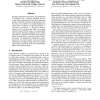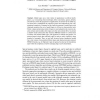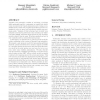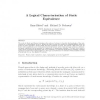109 search results - page 8 / 22 » Using First-Order Logic to Reason about Submodule Constructi... |
107
Voted
SYNTHESE
2008
15 years 2 months ago
2008
We add a limited but useful form of quantification to Coalition Logic, a popular formalism for reasoning about cooperation in game-like multi-agent systems. The basic constructs o...
132
Voted
ICLP
2004
Springer
15 years 8 months ago
2004
Springer
Abstract. In this paper we consider a logic programming framework for reasoning about imprecise probabilities. In particular, we propose a new semantics, for the Probabilistic Logi...
132
Voted
KI
2008
Springer
15 years 2 months ago
2008
Springer
Abstract. Modal logics see a wide variety of applications in artificial intelligence, e.g. in reasoning about knowledge, belief, uncertainty, agency, defaults, and relevance. From ...
127
Voted
ISSTA
2009
ACM
15 years 9 months ago
2009
ACM
Dynamic test generation consists of executing a program while gathering symbolic constraints on inputs from predicates encountered in branch statements, and of using a constraint ...
99
Voted
ENTCS
2007
15 years 2 months ago
2007
The work of Abadi and Fournet introduces the notion of a frame to describe the knowledge of the environment of a cryptographic protocol. Frames are lists of terms; two frames are ...




